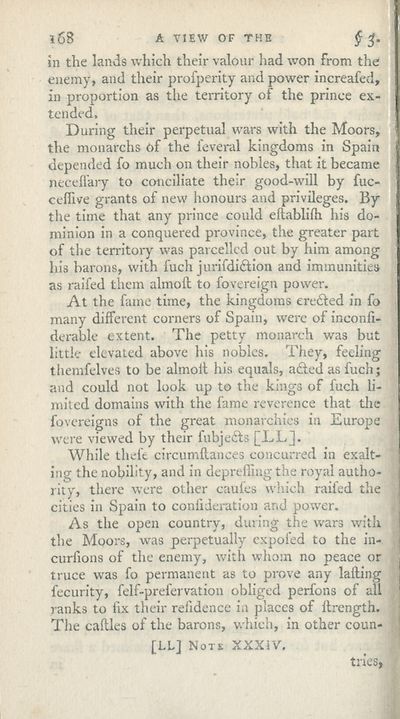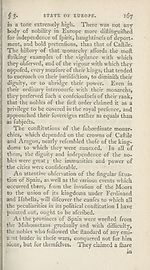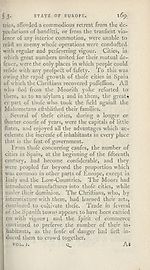Download files
Complete book:
Individual page:
Thumbnail gallery: Grid view | List view

A VIEW OF THE
l68 A VIEW OF THE $
in the lands which their valour had won from the
enemy, and their profperity and power increafed,
in proportion as the territory of the prince ex¬
tended.
During their perpetual wars with the Moors,
the monarchs of the feveral kingdoms in Spain
depended fo much on their nobles, that it became
necelfary to conciliate their good-will by fuc-
celhve grants of new honours and privileges. By
the time that any prince could eftablifh his do¬
minion in a conquered province, the greater part
of the territory was parcelled out by him among
his barons, with fuch jurifdiiftion and immunities
as raifed them almoft to fovereign power.
At the fame time, the kingdoms erected in fo
many different corners of Spain, were of inconfi-
derable extent. The petty monarch was but
little elevated above his nobles. They, feeling
themfelves to be almoit his equals, acted as fuch;
and could not look up to the kings of fuch li¬
mited domains with the fame reverence that the
fovereigns of the great monarchies in Europe
were viewed by their fubjedts [LL].
While theft circumftances concurred in exalt¬
ing the nobility, and in depreffing the royal autho¬
rity, there were other cautes which railed the
cities in Spain to confideration and power.
As the open country, during the wars with
the Moors, was perpetually expoled to the in-
curfions of the enemy, with whom no peace or
truce was fo permanent as to prove any lailing
fecurity, felf-prefervation obliged perfons of all
ranks to fix their refidence in places of llrength.
The caltles of the barons, which, in other coun-
[LL] Note XXXiV.
l68 A VIEW OF THE $
in the lands which their valour had won from the
enemy, and their profperity and power increafed,
in proportion as the territory of the prince ex¬
tended.
During their perpetual wars with the Moors,
the monarchs of the feveral kingdoms in Spain
depended fo much on their nobles, that it became
necelfary to conciliate their good-will by fuc-
celhve grants of new honours and privileges. By
the time that any prince could eftablifh his do¬
minion in a conquered province, the greater part
of the territory was parcelled out by him among
his barons, with fuch jurifdiiftion and immunities
as raifed them almoft to fovereign power.
At the fame time, the kingdoms erected in fo
many different corners of Spain, were of inconfi-
derable extent. The petty monarch was but
little elevated above his nobles. They, feeling
themfelves to be almoit his equals, acted as fuch;
and could not look up to the kings of fuch li¬
mited domains with the fame reverence that the
fovereigns of the great monarchies in Europe
were viewed by their fubjedts [LL].
While theft circumftances concurred in exalt¬
ing the nobility, and in depreffing the royal autho¬
rity, there were other cautes which railed the
cities in Spain to confideration and power.
As the open country, during the wars with
the Moors, was perpetually expoled to the in-
curfions of the enemy, with whom no peace or
truce was fo permanent as to prove any lailing
fecurity, felf-prefervation obliged perfons of all
ranks to fix their refidence in places of llrength.
The caltles of the barons, which, in other coun-
[LL] Note XXXiV.
Set display mode to:
![]() Universal Viewer |
Universal Viewer | ![]() Mirador |
Large image | Transcription
Mirador |
Large image | Transcription
| Antiquarian books of Scotland > Kings & rulers > History of the reign of the Emperor Charles V. > Volume 1 > (186) |
|---|
| Permanent URL | https://digital.nls.uk/109184563 |
|---|
| Description | By William Robertson. London : Cadell and Davies, 1798. |
|---|---|
| Shelfmark | ABS.1.76.13 |
| Additional NLS resources: | |
| Description | Thousands of printed books from the Antiquarian Books of Scotland collection which dates from 1641 to the 1980s. The collection consists of 14,800 books which were published in Scotland or have a Scottish connection, e.g. through the author, printer or owner. Subjects covered include sport, education, diseases, adventure, occupations, Jacobites, politics and religion. Among the 29 languages represented are English, Gaelic, Italian, French, Russian and Swedish. |
|---|

